Patisson: what is it, benefits, harms and varieties
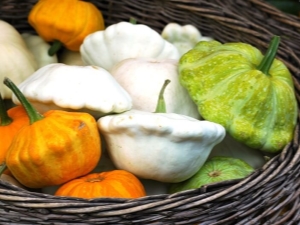
Patisson is a vegetable that many more people have heard about in our country than they have tasted. In agricultural periodicals, references to this plant have been found quite often over the years, however, so far it cannot be said that the culture has become common in our area. However, those who have tried to grow squash usually leave only positive reviews, so the culture deserves a closer look.

What is it and what does a vegetable look like?
Patisson has another name - a dished gourd, which gives answers to many questions of those who have little idea what it is. The plant really belongs to the Pumpkin family, but it should not be called a pumpkin itself, because, for example, cucumbers also belong to the same family. The vegetable is famous for its pulp, which surpasses even cucumbers in tenderness, as for taste, this fruit is often compared with artichokes.
As for the shape, as the official name implies, it is flat and vaguely resembling a plate, and the size is usually relatively small - somewhere on a large palm. Even the word "squash" is a kind of attempt to describe the appearance of a vegetable: it comes from the French word "pie", because it outwardly reminded the French of this particular dish.
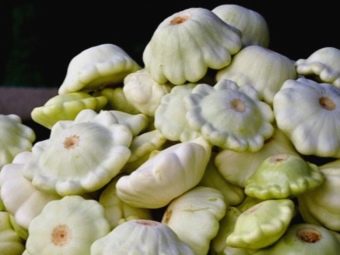

The fact that in our area the vegetable is relatively unpopular is not so surprising.For a long time, it remained a huge curiosity for all of Europe, because along with potatoes and tomatoes it was originally an American culture, which the first Europeans saw only at the end of the 15th century. However, the patisson moved to Western Europe from its homeland, and these are modern Mexico and Guatemala, quite quickly, not far behind the two popular aforementioned cultures, this happened in the 17th century.
At the same time, the expansion did not continue further: unlike the same potato, the vegetable turned out to be quite demanding on climatic conditions, and therefore, until recently, did not claim to be a gastronomic conquest of our country.
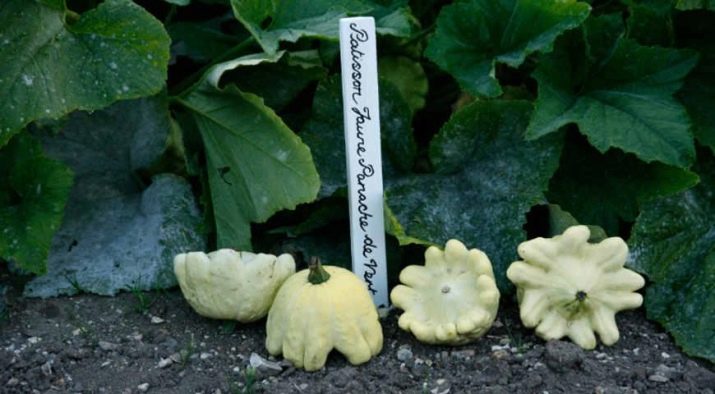
Composition and calories
An exotic vegetable can be a very interesting addition to a variety of dishes, but first you should figure out what the nutritional and energy value of unusual food is. Most of the carbohydrates in the product are 5.5 grams, which is typical for vegetables, and there are very few proteins and fats - 0.6 and 0.0001 grams, respectively. At the same time, the fresh product is distinguished by the highest juiciness, because 92% consists of water. The fiber content in the product is at the level of 1.3%.
The composition of the patisson contains various vitamins and useful trace elements, but vitamins C and A, as well as potassium and magnesium, are most noticeable. Such a composition is very useful for maintaining the normal circulatory system of the human body. It should also be noted a significant content of calcium, sodium and phosphorus, as well as B vitamins.
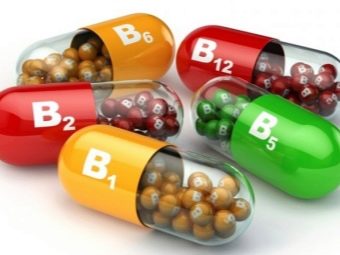
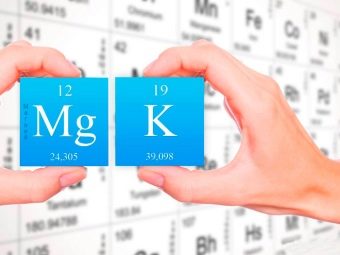
As for the calorie content, the patisson, even among other vegetables, is relatively safe for the figure.The absence of saturated fats and cholesterol, as well as a relatively small percentage of sugars, lead to the fact that the energy value of the squash has very modest indicators - only 18 kcal per 100 grams of product.
This means that you can use it almost unlimitedly, however, you should remember to supplement it with other products for a complete and balanced diet.

Beneficial features
The health benefits of regular consumption of squash are obvious to doctors, so they often prescribe this vegetable to people suffering from a variety of diseases. The possible positive effects of a diet with a significant proportion of this vegetable can have different vectors and affect a variety of ailments, we will highlight only the most notable results.
- Whoever does not want to get cancer should eat squash along with the skin. This part of the vegetable contains carotene, zeaxanthin and lutein - antioxidants that are actively involved in the elimination of free radicals from the human body, which are the main cause of oncology. In addition, such an action also affects the appearance of a person - he looks younger, and he feels appropriate.
- Pectin, present in sufficient quantities in the composition of the patisson, also "works" against cancer, but acts more narrowly, protecting the large intestine from potential problems.
- The vegetable contains a relatively rare substance - folate, which is actively involved in the synthesis of new cells and is necessary for the production of DNA. These processes are vital for the proper development of the fetus, so patisson in moderation will be very useful for pregnant women.
- Potassium, present in patisson, has a positive effect on the state of hypertensive patients, helping to reduce pressure and reduce heart rate. Thanks to the same mineral, the myocardium is strengthened.
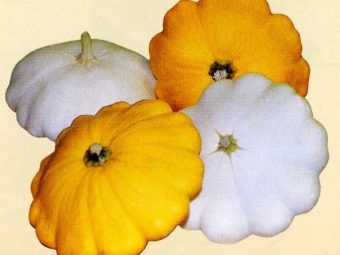

- Any child knows about the benefits of vitamin C, and yet only 100 grams of patisson provide a third of the daily requirement of this substance. It turns out that such a vegetable is an excellent remedy against any infection.
- The same vitamin C, combined with a significant percentage of magnesium, also found in the vegetable, helps reduce the risk of stroke.
- Patisson belongs to active choleretic products, therefore it usually has a positive effect on digestion, even if the food is mostly heavy.
- B vitamins help to establish the production of all the necessary hormones in the body, primarily serotonin, which, according to external sensations, is expressed as a consistently good mood and vigor, as well as regular sound sleep. For this reason, patissons are recommended both for those whose endocrine system does not work properly, and for patients recovering from nervous diseases.
- The oil pressed from patisson seeds is used to eliminate harmful microorganisms from the digestive tract. True, it should be clarified here that there is no official recognition for this method yet, it should be attributed, rather, to traditional medicine.
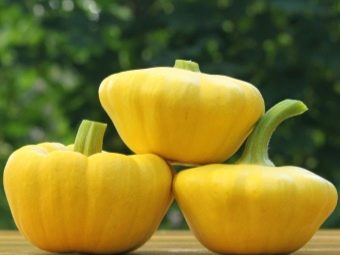
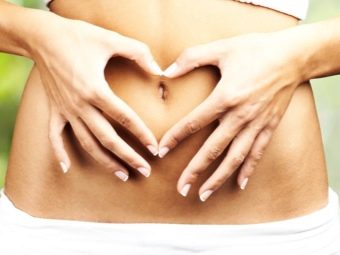
- The vegetable is very useful for men, as it increases potency and libido. Here again, the ability of the squash composition to prevent cancer affects - in this case, the effect is directed to the prostate gland.
- For vegetarians who do not accept the consumption of meat and other animal products, squash is one of the best available sources of B vitamins.
- Patisson has a pronounced diuretic effect, therefore it is indicated for those who suffer from edema. At the same time, the components of the product remove from the body not only excess water, but also sodium salts, which are often a catalyst for the accumulation of fluid in the body.
- Riboflavin in the patisson can help people suffering from migraines or constant headaches of any other nature. However, it should be noted here that the vegetable is still not so rich in useful components to solve the problem completely, because vitamin supplements will also have to be taken, just in smaller quantities.
Finally, it is worth saying that the patisson does not have “extra” parts - not only the pulp, but also the peel and seeds of this vegetable can benefit a person.
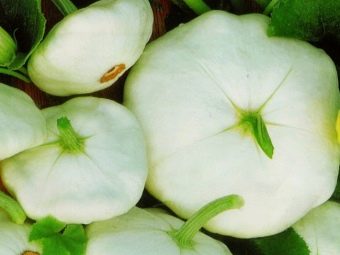

Harm
"Solar zucchini" (another popular name for patisson), like most other products on our planet, for all its benefits, has certain contraindications that somewhat limit or even completely prohibit its use by certain groups of people. You should be interested in such moments in advance, otherwise the product, considered by many as almost a panacea, can aggravate the already imperfect state of the body.
- Like many fiber-rich vegetables, squash helps to gently relax the digestive system, and this is in most cases considered a beneficial effect in helping to eliminate constipation. However, if the problem is completely opposite, that is, there is regular diarrhea or chronic dyspepsia, the use of the vegetable in question will only exacerbate the symptoms described.
- Patisson helps hypertensive patients lower blood pressure, but it has a similar effect on healthy people, and even on hypotensive people. For the latter, such an influence can be very dangerous, so eating a vegetable is undesirable.

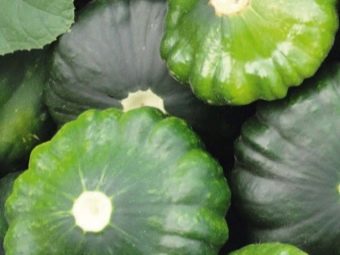
- Like many diuretic products, squash contains substances that promote the formation of kidney and gallstones. For a healthy person, moderate consumption of the product is most likely not dangerous, but if such a disease has already been diagnosed, then the risk is double: here the stones can increase and their movement will become more active.
- Separately, it should be said about canned patissons, which are contraindicated even for more groups of people than fresh vegetables. In addition to all the categories described, such a product is also undesirable for diabetics, since pumpkin is usually preserved with sugar. For the kidneys and pancreas, canned squash is more dangerous than fresh vegetables. This product is also not recommended for children under 10 years of age.
- Patisson is a rather rare product in our country, therefore even an adult may not suspect that he may be allergic to such a product. Therefore, if a person tries the product for the first time, the portion must be limited, allocating time to observe the reaction of the body.
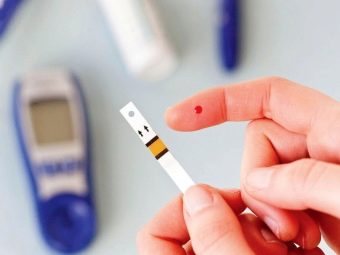
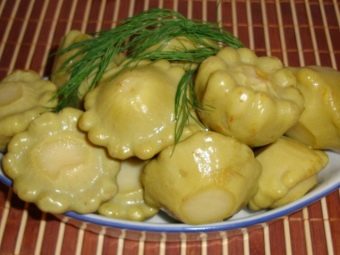
Varieties and their description
Although patissons are still a curiosity for us, many cultivars of this plant have been bred in the world, and some of them are the brainchild of domestic agronomists, so they grow without problems in our climate. They are worth considering more closely.
For open ground
Given the tropical origin of the vegetable, in our conditions, not every variety of it should be planted in open ground. Nevertheless, the construction of greenhouses for the sake of squash is unpopular in our country, therefore frost-resistant varieties for open ground are especially successful.
- "Cheburashka" judging by the reviews, it is the best solution for the post-Soviet space. Not only is this variety not too afraid of cool weather, but it also produces a harvest extremely quickly: it takes only 5-6 weeks, that is, not even a month and a half. Such characteristics make it possible to grow a vegetable even in a very short summer, and the result will be fruits weighing up to 400 grams.
Despite its undemanding to heat, such a patisson is still distinguished by a pleasant taste and juiciness, therefore it is a real find for northerners.
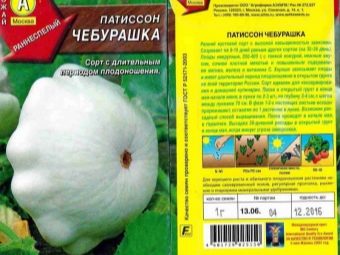
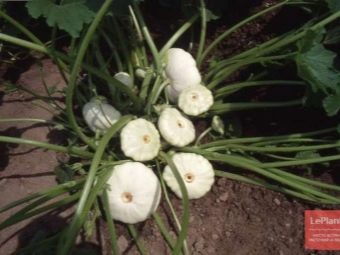
- "Umbrella" does not break early ripeness records - its ripening period can reach seven to eight weeks, although even such indicators make the vegetable early. But patissons of this variety are optimally suited for open ground in the sense that seeds can be planted without seedlings, although for the northern regions such a decision would be unreasonably risky. The variety in question is highly valued for its excellent yield: each bush produces fruits weighing up to 400 grams, and up to 5 kilograms of ripe vegetables are harvested from one plant.
The product has excellent taste, but it cannot be stored fresh for a long time, so large fruits are used for daily consumption as soon as possible after harvest, and smaller specimens are preserved in pickled form.
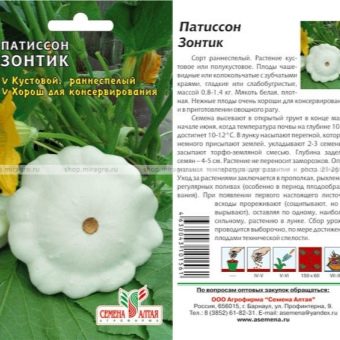

small and mini
It would seem that the large size of the fruit should attract buyers, however, as in the case of gherkins, the best squash for canning are those that are small in size.
- "Sun", for example, it is excellent for canning, not only because it produces fruits no more than 300 grams in weight, but also because of the uniformity of the crop: about 15 vegetables are obtained from a bush, which differ in the same shape and size. These bright yellow vegetables are used both for stuffing and for baking, but with their size they literally push housewives to pickle them whole.
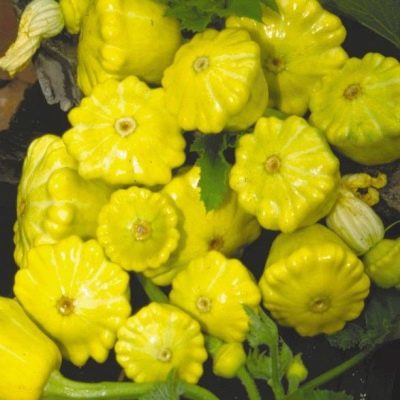
- "Disk" does not apply to squash varieties with the smallest fruits - the weight of a ripe vegetable usually ranges from 300-350 grams. However, this does not prevent housewives from actively using the fruits of this particular variety for conservation: the trick is that this variety can be rolled into jars even when not fully ripe, due to which the sizes are slightly smaller. At the same time, even the full maturation of the squash of this variety takes no more than six weeks, while it is possible to obtain raw materials for preservation literally in record time.
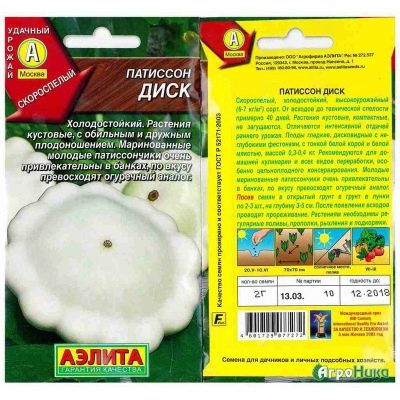
- "Penny" - the absolute champion among the patissons in terms of modest size, due to which it is also called the patisson gherkin. Such a fruit weighs ten times less than "normal", its average weight is only 15-30 grams, which means that it is the best option for conservation. Such tiny sizes lead to the fact that the vegetable will ripen in record time - usually it takes only five weeks for it. An additional advantage of the variety is that it can be "stored" directly on the branches, without tearing, for another two weeks after ripening.
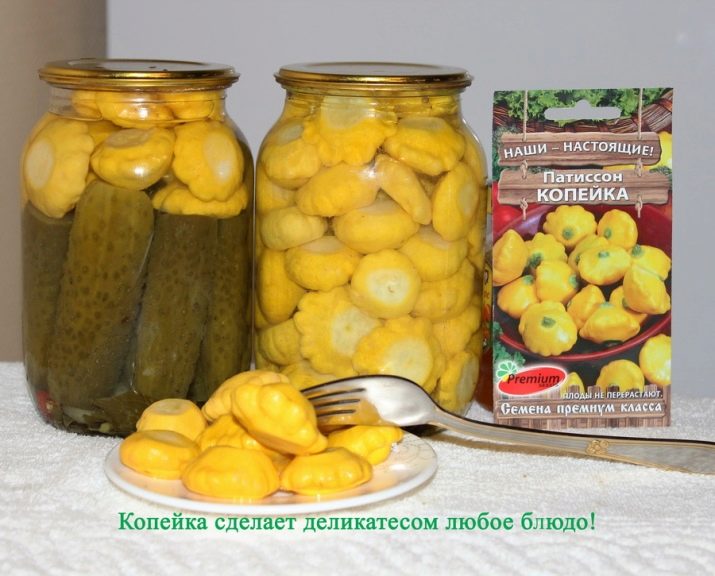
- "Sunny Delight", as the name implies, is the only squash variety bred far beyond the borders of our country, but still successfully growing here.The size of the fruits of such a plant compares favorably with all other squash - these are not quite small "berries" and not a "whole pumpkin", since the average weight is 60-80 grams. This variety is indifferent to drought, and bears fruit calmly until the first night frosts. The ripening period of fruits is approximately 6-7 weeks and, unlike competitors, they are stored fresh longer.
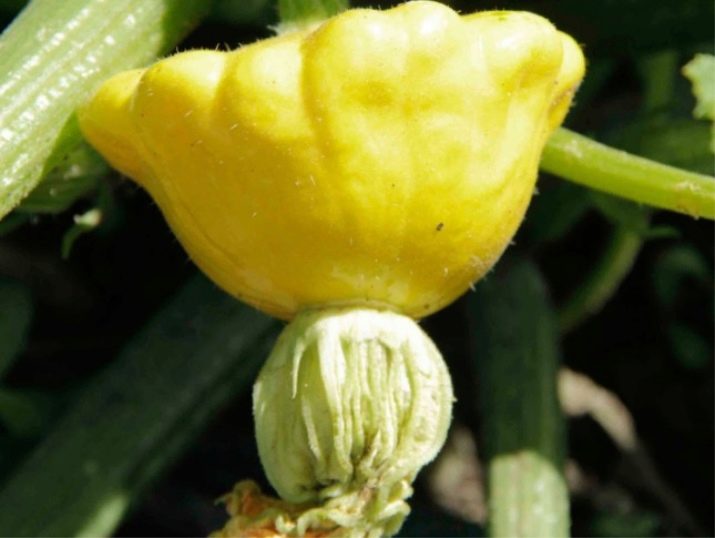
Bush
Patissons of this type are usually distinguished by the rather impressive size of both the plant itself and the crop.
- "UFO white" gives a harvest in about one and a half to two months, and is valued for the size of the fruit, which reaches 600 grams (up to 10 centimeters in diameter). The peel of such a vegetable is quite thick, and therefore allows the vegetable to lie a little longer, which distinguishes this variety from medium squash, even in the refrigerator with no more than five days of storage.
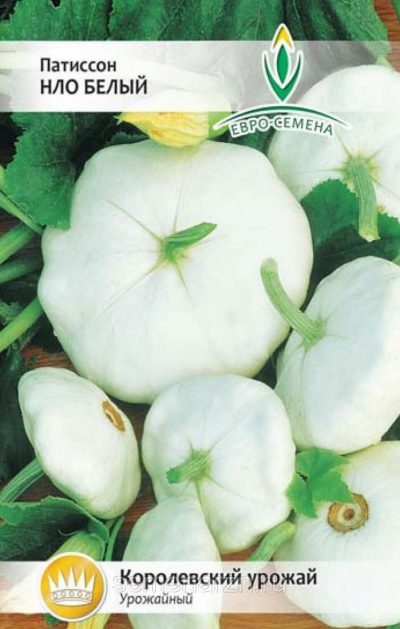
- "Piglet" is considered one of the most famous bush varieties, a huge plus of which is the ability to normally withstand the absence of not only heat, but also irrigation. A ripe fruit weighs no more than 300 grams, but for a plant that develops normally even at low positive temperatures, this is a very worthy indicator. Given the small size of the fruit, the variety is suitable for canning.
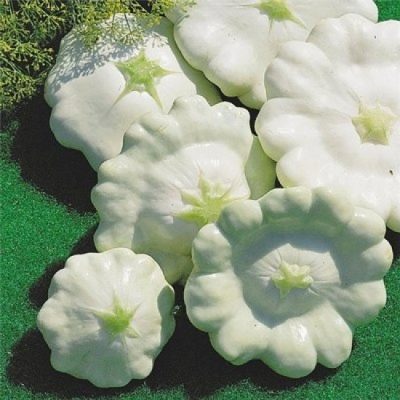
See the following video for growing squash.

















